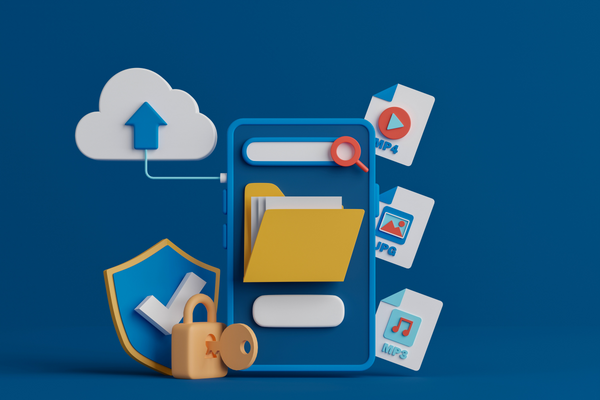
Are you a researcher struggling to manage your data? You're not alone. According to a recent survey done by Adverity, 67% of marketers at small and medium-sized businesses felt overwhelmed by the amount of data they had to manage. But don't worry – data management doesn't have to be a challenge.
In this blog, we'll explore what data management is, its importance, some common challenges when handling information, and the best strategies to help you easily manage research data.
What is Data Management?
Data management involves creating procedures for storing, organizing, and analyzing raw data to make them useful for your study. For market researchers, having a good data management system in place is essential because it ensures that your findings are trustworthy, accurate, secure, and easily accessible.
These systems store and consolidate various types of data from several sources. This includes demographic information, respondent feedback, customer behavior data, and audio and video content.
These play a key role in an organization’s data environment – making functions such as data preparation, cataloging, search, and governance simpler and less time-consuming. Effective data management makes it easier to interpret findings, identify patterns and trends, and make informed decisions that benefit the business.
Why is Data Management Important?
Data management is essential when analyzing at scale, resulting in up-to-date and actionable insights that could benefit customers and boost business performance. With the proper management software and practices, people within an organization can locate and get reliable information for their queries.
Some advantages of using effective data management solutions include the following:
Visibility
Data management is essential for visibility. With a robust system, researchers are able to access and analyze the vast amount of data available to them.
A data management solution lets you easily navigate and analyze their data to develop more informed strategies. This allows you to uncover trends, understand customer behavior, and gain deeper insights into their markets.
Security
Market researchers should be able to trust that their data is secure and protected from malicious actors. A secure project hub helps safeguard your respondents from various issues, such as data losses, identity thefts, and security breaches.
Having data management software with the proper authentication, encryption, and redundancy features helps you feel confident that your data is safe.
Scalability
Market researchers need to be able to access and analyze ever-growing amounts of data, either in volume or traffic. A scalable data management system allows you to accommodate more data without requiring additional resources or manual adjustments.
Scalability enables businesses to adjust their usage occasions with repeatable processes to keep data and metadata updated. An easily repeatable process helps organizations avoid duplications, such as employees conducting the same study or unnecessarily re-running costly queries.
Reliability
Data management is crucial when building reliability in your findings. Without this, researchers may struggle to trust the data they’re using.
Establishing processes and policies for data usage ensures that your research findings are accurate and up-to-date. This helps organizations respond more efficiently to their customers’ needs and any changes in the market.
Democracy
Data management tools and frameworks (e.g., data fabrics and data lakes) reduce data silos and owner dependencies within an organization. Data fabrics, for example, can help identify potential integrations across various datasets from different organizational functions such as marketing, sales, and HR.
On the other hand, data lakes remove dependencies by taking raw data from those functions and eliminating sole owners to a given dataset. These two concepts allow individuals within an organization to create or consume research insights.

Common Data Management Challenges
In today’s digital research landscape, proper handling of data is essential. However, scaling capabilities may be difficult if you're using conventional data management processes because governance or security could be compromised.
Therefore, it's important to further develop your systems to satisfy data requirements. To ensure reliable data can be found, modern data management software must handle a number of issues.
Here are three common data management challenges that researchers should be aware of:
1. Disorganized Data
All departments within your company have access to a wide array of data and have unique requirements to utilize it to its fullest. As the amount of data available increases, it becomes more difficult to manage and process data effectively.
With conventional models, IT has to set up the data for each case and then maintain the files or databases. When an organization accumulates more data, it can be difficult to keep track of what data is available, where it is located, and how to best utilize it.
2. Unqualified People
A continuous data flow creates the need for more people to help manage the influx of information. However, certain individuals may find it hard to comprehend complex data structures, naming conventions, and databases.
If the person is unequipped to analyze the data, certain errors in interpretation may happen. Furthermore, If data conversion takes up too much time or effort, the analysis itself may not occur. As a result, the potential value of research data may be lost or diminished.
3. Data Compliance
As more regulations are put in place to protect data security, it becomes more important to ensure that data is handled securely in compliance with today’s data laws. Therefore, researchers must understand how to use and manage data properly. This includes how personally identifiable information (PII) is used, stored, and monitored in accordance with privacy regulations (e.g., GDPR and HIPAA).
Data Management Best Practices
Data management is a critical part of any research project. It requires careful planning, organization, and execution to ensure data is collected, stored, and analyzed correctly. This helps you avoid common pitfalls to increase the accuracy of your results.
To ensure data is managed effectively, it is important to adhere to certain data management measures. Here are five best practices when handling research data:
1. Establish a data governance policy: A data governance policy should be established for users to be aware of the rules, roles, and responsibilities when managing data. A clear data governance framework includes specific procedures, policies, and permissions for each person on your team so they can access the relevant data to do their jobs.
2. Invest in data management software: Investing in high-quality data management software ensures that you have a unified solution for storing and organizing data, analyzing results, and collaborating with your research team.
3. Utilize data security protocols: Research should be safely stored in an organized and accessible format to prevent unauthorized access and loss. Some examples of security protocols include secure cloud storage, data encryption, and backup systems.
4. Develop a data management plan: A data management plan is a document that describes how data will be collected, stored, and used. It is crucial to develop a data management plan early on in the planning stages to ensure data is appropriately handled.
5. Regularly review data quality: As data is collected, it’s important to review data quality from time to time to ensure that each data point is managed effectively. This includes ensuring that information stored in the system is accurate and that any changes made to the data are recorded.
Effectively Manage Your Research Data with Civicom Glide Central®
Glide Central® is a data management tool that solves the organizational pain points when handling video and audio generated with IDIs and focus groups. Store and manage your data in a secure project hub, develop tags for keywords, generate human or automated transcripts, clip videos, and create storyboards. Glide lets you showcase the best data from your research. Get in touch with us to learn more about our unified storage, curation, and collaboration solution.


